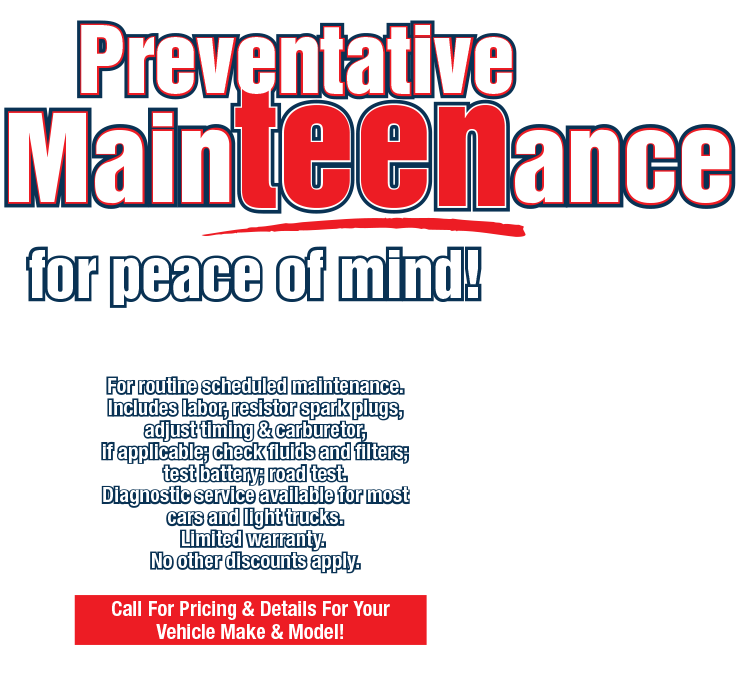This page provides answers to some of the most frequently asked questions about vehicle repair and service. We've thrown in some of our favorite tips and recommendations, too. Please call us or consult our Contact Us page for answers to your specific questions. We are happy to assist you!
-
How much air should I put in my tires?
Proper inflation is the single most important part of tire care. Check or adjust inflation every few months and always use the inflation recommended by the vehicle manufacturer. Checking air pressure should be standard procedure on any routine visit to your vehicle service center for oil services, tire rotations, or general maintenance and repair. For do-it-yourselfers you can find this information in your owner's manual, posted on the edge of the driver's door, on a door post, in the center console, or on the inside of the glovebox door. Be sure to check inflation when tires are COLD: when the vehicle has been driven less than a mile or one hour or more after driving. Use a good quality tire gauge. And don't forget to check the spare!
-
Should I rotate my tires?
The main purpose of regularly rotating tires is to achieve more uniform wear for all tires on the vehicle. It is recommended that you rotate your tires at least every 6,000 to 8,000 miles or uneven wear may develop. At strongly tire-oriented facilities this is a service typically done at no additional cost; along with free flat repairs, Nitrogen inflation, and an undercar inspection.
-
An illuminated light on my dash shows that I have a low tire. Can I just put air in it?
In many cases correcting the air pressure in your tires will extinguish the Tire Pressure Monitoring System (TPMS) warning light. Often seasonal temperature drops will lower tire air pressure a few pounds (a good case for Nitrogen – see 11 above) and trigger the TPMS warning light. In all cases where one or two particular tires are significantly lower than the others, or lower than the factory recommended pressure, a trained tire technician should examine the tire to determine the cause and examine the casing for signs of over stress. Some TPMS systems require special tools to access the vehicle computer. Advanced level tire technicians are trained and equipped for this technology.
-
What are the consequences of postponing maintenance?
Many parts on your vehicle are interrelated. Ignoring maintenance can lead to trouble: specific parts, or an entire system, can fail. Neglecting even simple routine maintenance, such as changing the oil or checking the coolant, can lead to poor fuel economy, unreliability, or costly breakdowns. It also may invalidate your warranty. Properly maintaining your vehicle is less expensive than repairs from negligence.
-
I have 100,000 mile spark plugs in my car. When will I need a tune-up?
In the traditional sense there is no such thing as a tune-up anymore. Carburetors and distributors with their myriad of parts destined to failure have been replaced with electronic injectors and electronic ignition systems. There is virtually little to wear out. Aging Ignition wires and spark plugs may continue to function for 100,000 miles but not optimally. The car manufacturer’s boastful claim of 100,000 between tune-ups has little grounding in common sense, and is mostly a marketing ploy. At the price of gasoline these days even a three percent decrease in fuel efficiency is expensive, not to mention ecologically unfriendly. A fresh set of spark plugs any time over 50,000 miles will normally make a noticeable difference.
-
I see a fluid leak under my car, what is it?
You can identify fluids by their color and consistency: • Yellowish green, pastel blue or florescent orange colors indicate an overheated engine or an antifreeze leak caused by a bad hose, water pump or leaking radiator. • A dark brown or black oily fluid means the engine is leaking oil. A bad seal or gasket could cause the leak. • A red oily spot indicates a transmission or power-steering fluid leak. A puddle of clear water usually is no problem. It may be normal condensation from your vehicle's air conditioner.
-
I smell something in /around my car, what could it be?
• The smell of burned toast - a light, sharp odor - often signals an electrical short and burning insulation. To be safe, try not to drive the vehicle until the problem is diagnosed. • The smell of rotten eggs - a continuous burning-sulfur smell - usually indicates a problem in the catalytic converter or other emission control devices. Don't delay diagnosis and repair. • A thick acrid odor usually means burning oil. Look for sign of a leak. • The smell of gasoline vapors after a failed start may mean you have flooded the engine. Wait a few minutes before trying again. If the odor persists, chances are there's a leak in the fuel system - a potentially dangerous problem that needs immediate attention. • Burring resin or an acrid chemical odor may signal overheated brakes or clutch. Check the parking brake. Stop and allow the brakes to cool after repeated hard braking on mountain roads. Light smoke coming from a wheel indicates a stuck brake. The vehicle should be towed for repair. A sweet, steamy odor indicates a coolant leak. If the temperature gauge or warning light does not indicate overheating, drive carefully to the nearest service station, keeping an eye on your gauges. If the odor is accompanied by a hot, metallic scent and steam-from under the hood, your engine has overheated. Pull over immediately. Continued driving could cause severe engine damage. The vehicle should be towed for repair.
-
My car is making a terrible sound, what information will help?
Squeaks, squeals, rattles, rumbles, and other sounds provide valuable clues about problems and maintenance needs. Here are some common noises and their definitions. Squeal - A shrill, sharp noise, usually related to engine speed. Click - A slight sharp noise, related to either engine speed or vehicle speed. Screech - A high-pitched, piercing metallic sound; usually occurs while the vehicle is in motion. Rumble - a low-pitched rhythmic sound. Ping - A high-pitched metallic tapping sound, related to engine speed. Heavy Knock - A rhythmic pounding sound.. Clunk - A random thumping sound. The more details you can provide us, the better chance of locating the problem quickly. Does the noise occur when the engine is cold or warm? Hot or cold outside, rainy or dry? Does the noise occur while driving or only when parked? These clues help the technician diagnose your problems faster, saving you time and money!
-
How often should I change my oil?
Most car manufacturers say to change your oil every 7,500 miles unless you drive in severe conditions. Severe conditions are defined as dirty or dusty roads, extremely hot or cold climates, a lot of stop and go driving, taking long trips or if you tow a trailer. If you answer yes to any of the severe driving conditions, your vehicle falls into the severe conditions category, or the 3,000 mile oil change interval.









